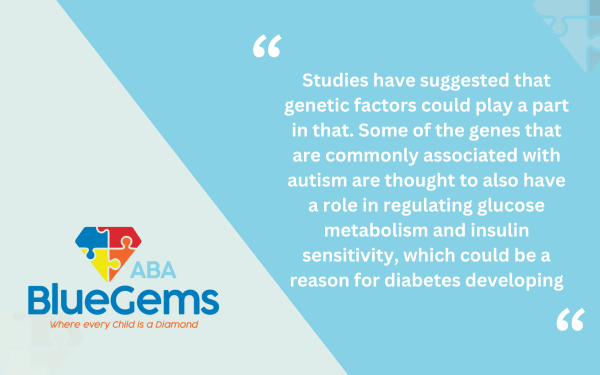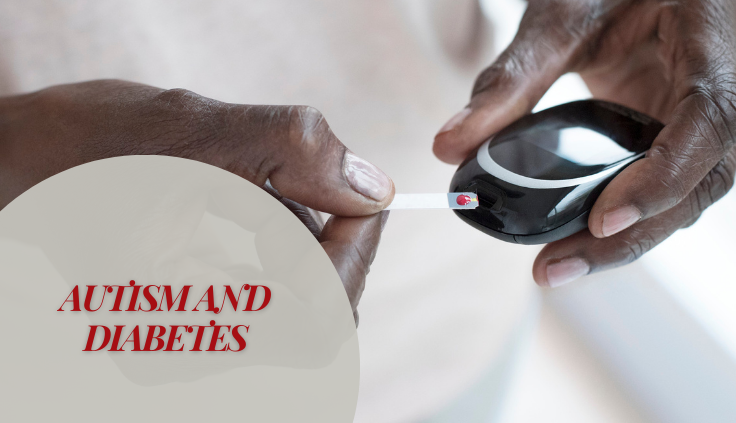Autism and Diabetes
Diabetes1 is a serious condition that affects a significant number of people in the United States. The U.S. Centers for Disease Control and Prevention says that as of 2021, the crude estimate was that 11.6% of the total population in the U.S. had diabetes, with another 3.4% having potentially undiagnosed diabetes.
On its own, diabetes — which occurs when your blood sugar is too high2 — can also lead to serious health issues, including kidney disease, vision loss and heart disease.
Studies have shown that people who have autism spectrum disorder (ASD) could be at a higher risk to develop diabetes than the general population. Plus, pregnant mothers who have diabetes could be at higher risk of having a child who has autism.
Significant links between autism and diabetes exist on multiple levels3, and we’ll discuss that topic below.
Table Of Contents
Are People with Autism More at Risk for Diabetes?
A recent review of studies that was published in the JAMA Pediatrics journal found that children who have autism are more at-risk to developing both of the major types of diabetes.
According to this review, those who have autism had a 57% greater risk than their neurotypical peers of developing diabetes4.

For type 1 diabetes — which is something people are born with — that risk was 64% higher in individuals with autism. For type 2 diabetes — which develops after a person is born, and typically later in life — the risk was even more pronounced, with it being 146% greater in people with autism4.
People on the autism spectrum commonly suffer from comorbidities. In other words, they often have other conditions at the same time as ASD — whether it’s psychiatric, such as anxiety or depression; sleep-related, such as trouble falling asleep, staying asleep or sleep apnea; or other conditions such as epilepsy, ADHD and more.
| Diabetes Type | Risk Increase | Notes |
|---|---|---|
| Type 1 Diabetes | 64% higher | Type 1 is typically diagnosed in childhood and is often genetically linked. |
| Type 2 Diabetes | 146% higher | Type 2 usually develops in adulthood and is influenced by diet and lifestyle. |
| Any Diabetes | 57% higher | Overall risk increase in individuals with autism vs. neurotypical peers. |
What is the Reason for the Higher Risk with Autism and Diabetes?
There’s no clear-cut answer as to why people with autism are more at-risk to developing diabetes.
Studies have suggested that genetic factors could play a part in that. Some of the genes that are commonly associated with autism are thought to also have a role in regulating glucose metabolism and insulin sensitivity, which could be a reason for diabetes developing5.

Another reason has to do with the fact that some children on the autism spectrum also struggle with eating-related issues.
Some children, for instance, have aversions to certain smells, tastes or textures because of their sensory sensitivities. Others thrive when they stick to a routine and repeat that routine every day.
Both of these characteristics of autism could result in children eating a more restrictive diet, without a wide variety of fruits, vegetables and healthy proteins. In the long run, that could cause them to be deficient in certain vitamins and nutrients, while also having higher blood sugar.
| Factor Type | Description | Potential Impact on Diabetes Risk |
|---|---|---|
| Genetic | Overlap in genes linked to both ASD and insulin/glucose regulation. | May predispose individuals to diabetes. |
| Dietary | Sensory sensitivities can lead to restrictive eating habits lacking in variety. | Poor nutrition can elevate blood sugar levels. |
| Behavioral | Repetitive routines may include limited or unhealthy food choices. | Contributes to poor diet and potential insulin resistance. |
What Role Does Maternal Diabetes Play in Autism?
Separate research has analyzed the role that maternal diabetes6 could play in autism. What those studies have found is that mothers who have diabetes while pregnant — whether it’s type 1, type 2 or gestational diabetes — were more at risk of having a child with autism than those who aren’t diabetic.
While only about 3% of women between 20 and 44 years old have diabetes in the U.S.7, more than 9% have gestational diabetes8. And while that’s a temporary condition that only affects a mother’s blood sugar levels while she’s pregnant — and often corrects itself after birth — it can still play a significant role in the neurological development or their child.
This is another reason why early detection of diabetes is so crucial in pregnant mothers so that the proper precautions can be taken to potentially reduce the risk of their child having autism.
| Maternal Diabetes Type | Autism Risk in Child | Notes |
|---|---|---|
| Type 1 Diabetes | Elevated | Chronic condition present before pregnancy can affect fetal development. |
| Type 2 Diabetes | Elevated | Often undiagnosed; affects maternal glucose metabolism during pregnancy. |
| Gestational Diabetes | Elevated (temporary type) | Affects ~9% of pregnant women; still linked to increased autism risk. |
Blue Gems ABA Treats Children with ASD
Many links have been found between autism and diabetes. Not only are people with ASD more at risk of developing diabetes, but diabetic mothers are more at risk of having children with autism.
This is why it’s so important to help children with autism create healthy habits early in life so they can avoid having high blood sugar.
At Blue Gems ABA, we support children with ASD by administering applied behavior analysis, or ABA therapy. This science-based approach to learning helps children build social, communication and daily life skills they commonly struggle with, while also helping them modify certain behaviors.
In doing so, we help children on the autism spectrum grow, build skills and live healthier lives.
To learn more, please contact us today.
References
- https://www.who.int/news-room/fact-sheets/detail/diabetes#:~:text=Overview,hormone%20that%20regulates%20blood%20glucose.
- https://www.mayoclinic.org/diseases-conditions/hyperglycemia/symptoms-causes/syc-20373631
- https://www.sciencedirect.com/science/article/pii/S0149763422000811
- https://pmc.ncbi.nlm.nih.gov/articles/PMC9887535/#:~:text=Based%20on%20our%20results%2C%20individuals,atherosclerotic%20heart%20disease%20by%2045.9%25.
- https://pmc.ncbi.nlm.nih.gov/articles/PMC6355780/
- https://pubmed.ncbi.nlm.nih.gov/25871668/
- https://www.niddk.nih.gov/health-information/health-statistics/diabetes-statistics
- https://diabetes.org/living-with-diabetes/pregnancy/gestational-diabetes




